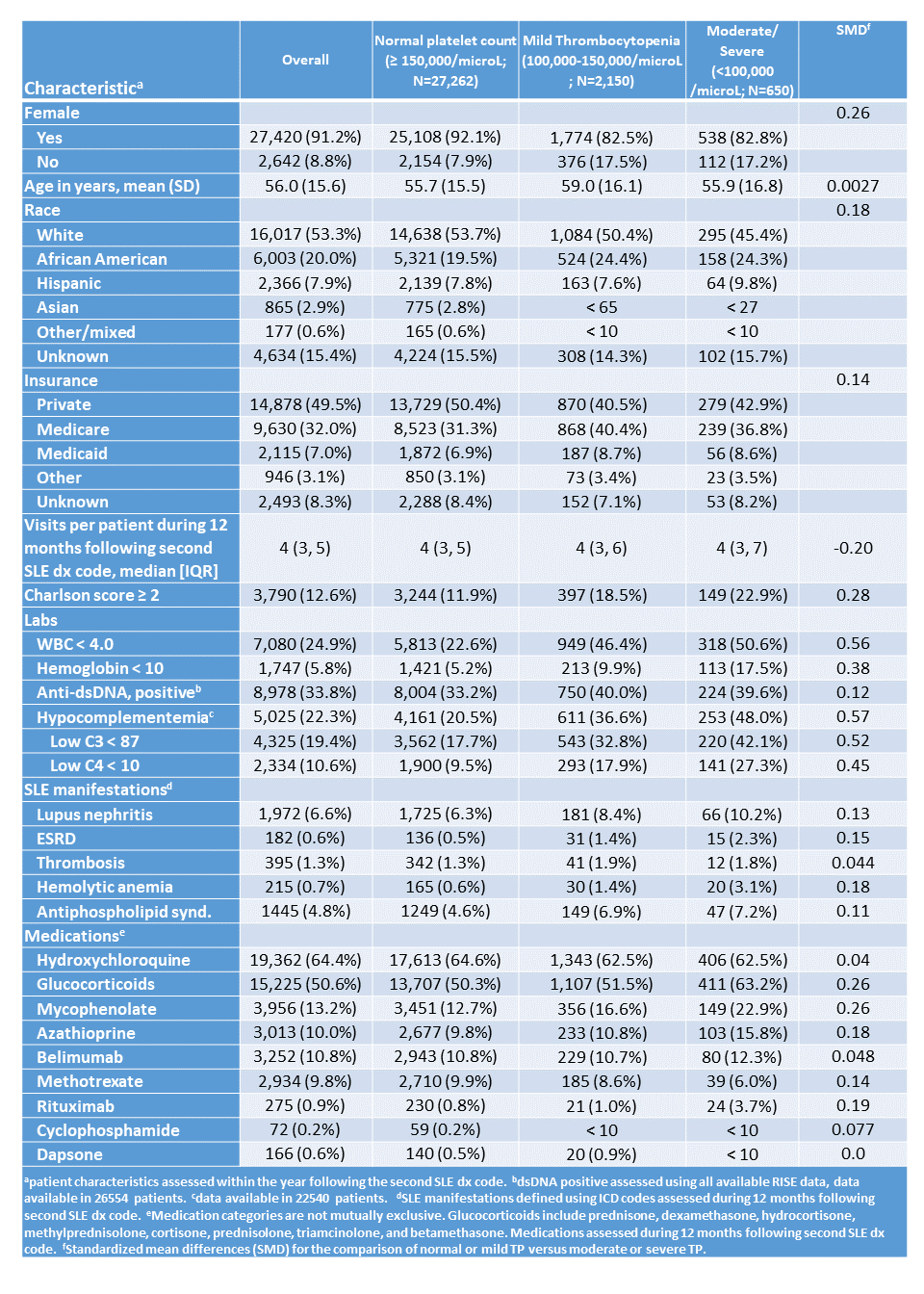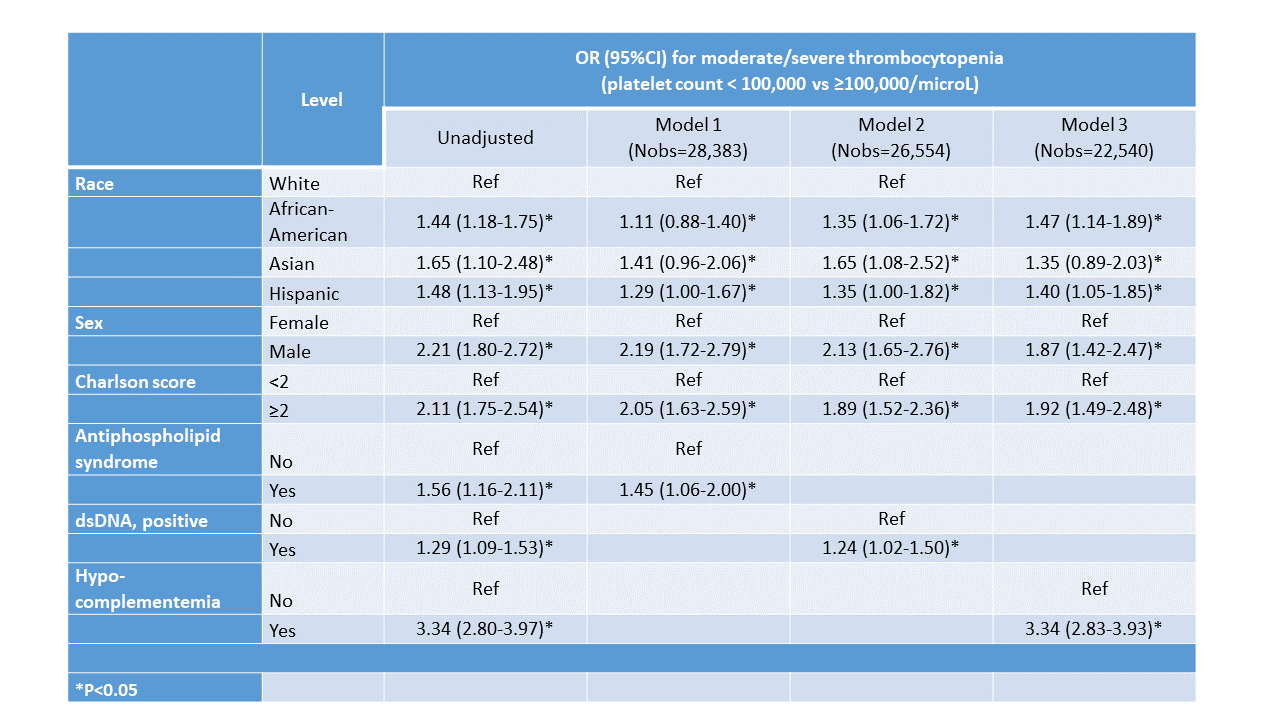Session Information
Date: Tuesday, November 19, 2024
Title: Abstracts: SLE – Diagnosis, Manifestations, & Outcomes III: Targets, Outcomes & Comorbidity
Session Type: Abstract Session
Session Time: 11:00AM-12:30PM
Background/Purpose: Systemic lupus erythematosus (SLE) is an autoimmune rheumatic disease with a very heterogeneous presentation. Thrombocytopenia (TP) is an infrequent presentation in patients with SLE Severe TP may be associated with major organ involvement and a poor prognosis in SLE. To assess the prevalence of TP in patients with SLE and examine its association with demographic and clinical factors.
Methods: We used data from the ACR’s Rheumatology Informatics System for Effectiveness (RISE) registry, a large electronic health record-enabled registry that collects data as part of routine clinical care and includes information such as patient demographics, diagnoses, procedures, medications, and laboratory test results. Included patients were ≥18 years old, with ≥2 SLE codes ≥30 days apart between 2016 and 2022, and who had a valid CBC recorded within 1 year of the second SLE code. Patients with RA, scleroderma, or inflammatory myopathy were excluded. TP was classified based on the lowest platelet count within 1 year of the second SLE code: mild: 100,000 – 150,000/microL, moderate: 50,000 – 99,000/microL, severe: < 50,000/microL. We reported the frequency of TP by demographic and clinical characteristics. To evaluate factors associated with moderate-severe TP (platelet count < 100,000/microL), we constructed a series of multi-level logistic regression models controlling for covariates and accounting for clustering by practices.
Results: The study included 30,062 patients, which was 91.2% female, with mean age 56 years (SD:16). 53.3% were White, consistent with the demographics of patients across the registry. 2800 SLE patients had TP (9.3%) and severe TP was detected in 150 patients (0.5%). The frequencies of male sex, African-American and Hispanic races, lupus nephritis, leukopenia, anemia, hypocomplementemia, dsDNA positivity, end-stage renal disease, thrombosis, hemolytic anemia, anti-phospholipid syndrome and the presence of multiple comorbidities were significantly higher patients with moderate-severe TP compared to SLE patients (Table 1). In the moderate-severe TP group, the use of many DMARDs was significantly higher, although methotrexate use was less common. Multivariable logistic regression analysis showed persistent independent effects of sex, race/ethnicity, the presence of multiple comorbidities, and hypocomplementemia on the risk of moderate-severe TP in SLE (Table 2).
Conclusion: Severe TP was rare in patients with SLE in the RISE registry compared to previous SLE series. The available literature provides data mostly from selected tertiary centers, which may not fully represent the spectrum of SLE disease seen in community practices. Apart from factors associated with serologically active SLE, the presence of multiple comorbidities, male sex, and non-white race were associated with TP in SLE. Further research is needed to comprehend the precise mechanism and clinical significance of TP in SLE patients.
The data presented here was supported by the American College of Rheumatology’s RISE Registry. However, the views expressed represent those of the author(s) and do not necessary represent the views of the American College of Rheumatology
To cite this abstract in AMA style:
Pamuk O, Fitzpatrick J, Li J, Schmajuk G, Magrey M. Thrombocytopenia in Patients with Systemic Lupus ErythematosusReal-World Data Based on a Nationwide Database, RISE [abstract]. Arthritis Rheumatol. 2024; 76 (suppl 9). https://acrabstracts.org/abstract/thrombocytopenia-in-patients-with-systemic-lupus-erythematosusreal-world-data-based-on-a-nationwide-database-rise/. Accessed .« Back to ACR Convergence 2024
ACR Meeting Abstracts - https://acrabstracts.org/abstract/thrombocytopenia-in-patients-with-systemic-lupus-erythematosusreal-world-data-based-on-a-nationwide-database-rise/


